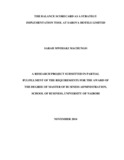| dc.description.abstract | The environment within which the hospitality industry operates in Kenya has become
very competitive as attributed to the many mushrooming hotels from five star hotels to
three star hotels. The growth and competition is also surrounded by many challenges such
as the rise in insecurity, focus on social media, digital rankings and referrals, a high level
of standards in service among others. To remain competitive, any player in this industry
must prove to be different and unique thus the need to not only develop strategies and
strategic goals but also to have effective tools for implementing these strategies. This
study sought to look at the balance scorecard as a tool for strategy implementation at
Sarova hotels limited and the challenges faced in the use of this strategy implementation
tool. The findings of the study would also benefit the other stake holders in the hospitality
industry and the government since hospitality is a key revenue earner for the government.
The research was done using a case study design and the object of the case study was
Sarova Hotels Limited. A case study was chosen because it offered the opportunity to do
an in-depth analysis of Sarova Hotels Limited as regards the use of the balance scorecard.
An interview guide was used and five managers from senior, middle and lower level
management were interviewed. The data was analyzed using content analysis. The
findings were summarized and presented in this research project. Findings from the
research brought out that the balance scorecard has been instrumental in helping Sarova
hotels attain their strategic goals such as revenue growth, brand awareness, innovation in
product and service delivery and a high guest satisfaction index. However Sarova hotels
has in the past to date faced various challenges in the use of the balance scorecard in
strategy implementation such as the balance scorecard as a tool for Sarova strategy
communication from the directors to the junior employees, preparation of the balance
scorecard, review and evaluation of the balance scorecard, performance rewards attached
to the balance scorecard among others. Some of the recommendations were better
communication of the scorecard from the senior management to the junior management,
need to make specific, measurable, achievable, realistic and timely strategic goals in the
scorecard, relook into the balance scorecard evaluation process, exploration of other
forms of reward in addition the bonus as a way of motivating outstanding performance
among others. Some of the recommendations for further research proposed were that
studies should be done to survey the various challenges that are encountered by other
hospitality institutions that have embraced the balance scorecard as a tool for strategy
implementation and effective ways of evaluating the balance scorecard as a tool for
strategy implementation. In the course of conducting the research, the main limitation
encountered was the fact that the managers interviewed have busy schedules thus
securing an appointment for the interview took time delaying the acquisition of required
information for this research. | en_US |

